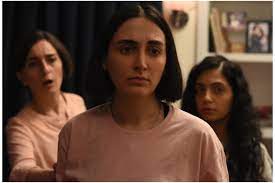Eye For Film >> Movies >> The Seed Of The Sacred Fig (2024) Film Review
The Seed Of The Sacred Fig
Reviewed by: Amber Wilkinson

Having considered the death penalty in Iran from a number of different angles in There Is No Evil, Mohammad Rasoulof includes the subject as a background note in the Oscar-nominated Seed Of The Sacred Fig. His thriller is driven by the protests surrounding Mahsa Amini, who died in the custody of Iran’s morality police after being arrested for the ‘improper’ wearing of a hijab. A film that takes no prisoners in its own assessment of the patriarchy - and which is peppered with genuine footage of the brutality of the security services in the country - it is grittily compelling even if its last act feels overlong and plays out in formulaic thriller territory.
The death penalty is part of the daily routine for Iman (Missagh Zareh), a civil servant who has just been promoted to “investigator” after two decades, a stepping stone which he hopes will lead to his becoming a Revolutionary Court judge. He is shocked to discover that investigating is barely called for and that he is, instead, expected simply to sign-off on the death penalty when required without reading the case file beforehand. Still, the promotion brings with it status and, soon the family hopes, a bigger house, but it also means that he, his wife Namjeh (Soheila Golestani) and their daughters Rezvan (Mahsa Rostami) and Sana (Setareh Maleki) must conduct themselves with the maximum amount of decorum.
Namjeh takes this instruction to heart, attempting to restrict her daughters’ online activity and even going so far as to police their friends. This isn’t just a case of cracking down on them for the sake of principle but also partially stems from fear. You can make a lot of enemies by signing death penalties - as evidenced by the gun that comes with Iman’s new job - so keeping contact with those outside the family and work circle is advisable.
The gun will later become a flashpoint in the household but not before one of Rezvan’s friends, Sadaf (Niousha Akhshi) shockingly brings home the arbitrary nature of the ‘justice’ being meted out at the protests.
Although the trajectory of Iman is a vital part of this film, it is Namjeh who is the focus. Initially a true believer in what the government tells her and what she sees on television, her perspective begins to shift courtesy of her daughters’ experiences. Essentially we are watching a battle for the future of the country, between the old and the young, playing out in microcosm. Golestani - who is currently barred from leaving Iran and is facing charges of “spreading corruption on earth and propaganda against the regime” - is crucial to his, her nuanced performance bringing home the shift in allegiance from her husband and the state to her daughters.
Rasoulof - who managed to flee Iran in 2024 after being sentenced to flogging in jail - is at his best when he is evoking the paranoia of Iman. As the patriarch drives home in fear at one point, even though he is theoretically safe in the confines of his car, there’s a claustrophobia driven by the unknown people nearby, whether it's the woman with no headscarf in the car next to him or the bike rider coming too close for comfort. His anxiety leads to increasingly controlling behaviour as we realise he has internalised his commitment to the regime to such a degree that obedience to it trumps even his nearest and dearest.
If the final stage of the film falls back on familiar ‘women in peril’ scenarios, and leans heavily towards melodrama, it has the advantage of being rooted in the family dynamic that Rasoulof has carefully established before. The regime may be focused on the flash of protest, but the filmmaker suggests the real threat to them is that which stems from the youthful foundations of society that are shifting dangerously beneath their feet.
Reviewed on: 02 Mar 2025















